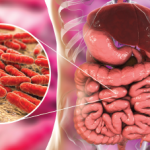
Dr. Bég
“It lives in the gut of almost 90% of cattle in the United States,” says rheumatologist Shazia Bég, MD, an assistant professor of rheumatology at the UCF College of Medicine, and study co-author. “MAP can lead to a systemic infection with manifestations very similar to Crohn’s disease.” Studies have linked both Johne’s and Crohn’s disease to MAP infections.
Fascinated that many autoimmune diseases, from Crohn’s to multiple sclerosis to RA, share the common symptom of severe inflammation (albeit in different parts of the body), as well as nearly the same currently approved biologic treatment, Dr. Naser became curious about what else these diseases might have in common. He and his team partnered with Dr. Bég at the university’s medical school, and her patients participated in the study.
“In the last decade, Dr. Naser and his team had done quite a bit of research on Crohn’s disease and MAP and published very interesting findings that showed that compared to controls, a greater percentage of patients with Crohn’s disease and type 1 diabetes had serum cultures that were positive for MAP bacteria,” Dr. Bég says. “There’s a theory that’s been going around for the last decade that this MAP bacteria could be one of the causes for immune dysregulation, causing Crohn’s disease. We hypothesized that [because RA] is a systemic autoimmune disease with some joint manifestations similar to Crohn’s disease, perhaps MAP is also present more in [RA] patients through the same mechanisms.”
According to the study, 78% of the patients with RA were found to have a mutation in the PTPN2/22 gene, the same genetic mutation found in Crohn’s patients, and 40% of that number tested positive for MAP. Finding two mutated genes in both RA patients and Crohn’s patients confirmed Dr. Naser’s question as to why these two diseases share so much. “Finding the bacteria in the blood of [RA] patients was surprising and confirmed that these diseases not only share a genetic mutation, they also share an environmental trigger. We cannot change our genetic code, but we can do more to avoid environmental triggers.”
Researchers have studied identical-twin cases in which one has developed RA and the other has not. “This implies genes are not the only factor that cause RA. There can be many different things in the environment that might interact with genes and cause immune activation and lead to RA,” Dr. Bég says. “Smoking cigarettes has been proven to increase your risk for developing RA. The presence of MAP bacteria may be another risk factor.”
‘We should be aware of what we eat & how our food is processed, because there is growing evidence that bacteria present in foods may activate different autoimmune diseases.’ —Dr. Bég
MAP in Food
Special interest groups that promote plant-based diets and veganism have run with the story since the research was published as confirmation to avoid beef and its byproducts to remain healthy. But Dr. Bég, whose patients with RA volunteered to participate in the study and were tested for MAP, says this is just the beginning of testing their hypothesis.


